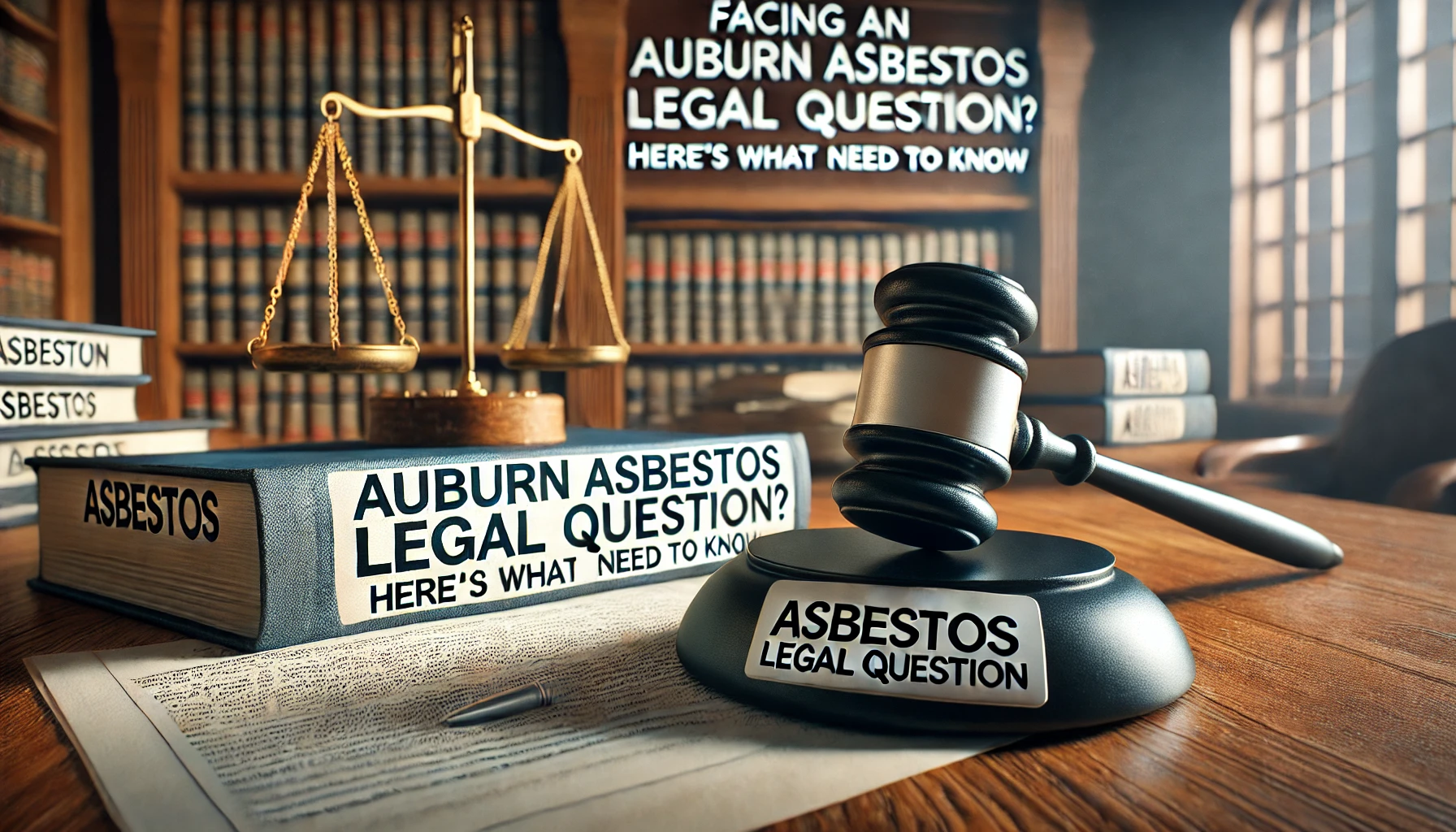Introduction
Asbestos is a Silent Killer—it’s a dangerous substance that can lead to severe health issues, and the legal battle around it is just as daunting.
In Auburn, where asbestos exposure has been a growing concern, understanding your legal rights is crucial. Asbestos is a naturally occurring mineral once hailed for its fire-resistant properties. However, over time, it has been linked to serious health risks, such as mesothelioma and lung cancer. These diseases often manifest years after exposure, making legal questions around asbestos highly complex and urgent.
Why is this especially relevant in Auburn?
Auburn has a history tied to industries where asbestos was widely used. This history makes asbestos legal questions in Auburn not just important, but necessary for anyone who may have been exposed. Whether you’re a resident, a worker, or a property owner, understanding the legal landscape around asbestos in Auburn could protect your health and your rights.
2. Understanding Asbestos and Its Risks
What is Asbestos?
Asbestos is a naturally occurring mineral that was once prized for its durability and resistance to heat. For decades, it was a go-to material in construction, shipbuilding, and manufacturing due to its ability to insulate and fireproof. You’d find asbestos in insulation, roofing, flooring, and even in some household products. However, the very fibers that made asbestos so useful are also what make it so dangerous when disturbed.
Health Risks Associated with Asbestos
Exposure to asbestos fibers is a serious health hazard. When these tiny fibers become airborne and are inhaled, they can lodge in the lungs and other tissues, leading to life-threatening diseases. The most notorious of these is mesothelioma, a rare and aggressive form of cancer that affects the lining of the lungs, heart, or abdomen. Lung cancer and asbestosis, a chronic lung condition caused by scarring, are also linked to asbestos exposure. These diseases often develop decades after initial exposure, making them particularly insidious.
Asbestos in Auburn
Auburn is no stranger to the risks posed by asbestos. Older buildings, particularly those constructed before the 1980s, are likely to contain asbestos in their insulation, roofing, or flooring materials. Industrial sites in Auburn, especially those involved in manufacturing or construction, may also have a legacy of asbestos use. If you’re living or working in Auburn, understanding the potential presence of asbestos is crucial for safeguarding your health. Whether you’re renovating an old home or simply concerned about exposure, knowing where asbestos might be lurking can help you take action and avoid serious health risks.
3. Legal Rights of Asbestos Exposure Victims in Auburn
Legal Framework for Asbestos Cases
In Auburn, victims of asbestos exposure are protected under a comprehensive set of laws and regulations designed to hold responsible parties accountable. State and federal laws mandate strict guidelines for the use, removal, and disposal of asbestos-containing materials. In Alabama, specific asbestos abatement regulations are enforced to minimize exposure and protect public health. Additionally, there are federal laws like the Clean Air Act and OSHA regulations that require employers to provide safe working conditions free from asbestos hazards. These laws collectively ensure that those exposed to asbestos have legal recourse to seek justice.
Eligibility for Filing a Lawsuit
If you’ve been diagnosed with an asbestos-related illness, you may be eligible to file a lawsuit. Key criteria include:
- Diagnosis: You must have a confirmed diagnosis of an asbestos-related disease such as mesothelioma, lung cancer, or asbestosis.
- Exposure History: You need to provide a clear history of asbestos exposure, including where, when, and how you were exposed. This could involve exposure at work, in your home, or through secondary contact.
- Statute of Limitations: In Alabama, the statute of limitations for filing an asbestos lawsuit is typically two years from the date of diagnosis or discovery of the illness. This means it’s crucial to act quickly once you become aware of your condition.
Meeting these criteria is essential for pursuing legal action and obtaining compensation.
Types of Legal Claims
Victims of asbestos exposure in Auburn have several legal avenues to pursue:
- Personal Injury Claims: If you’ve been diagnosed with an asbestos-related disease, you can file a personal injury claim against those responsible for your exposure, such as employers, manufacturers, or property owners.
- Wrongful Death Lawsuits: If a loved one has passed away due to an asbestos-related illness, surviving family members can file a wrongful death lawsuit to seek compensation for their loss.
- Asbestos Trust Fund Claims: Many companies responsible for asbestos exposure have established trust funds to compensate victims. If the company responsible for your exposure has filed for bankruptcy, you may still be able to file a claim against these trust funds.
Navigating Columbus Asbestos Legal Questions: What You Should Know
4. Navigating the Legal Process in Auburn
Finding the Right Asbestos Attorney
When dealing with an asbestos-related case in Auburn, hiring a specialized asbestos attorney is critical. These cases are highly complex, involving intricate laws and regulations, and only an attorney with deep experience in asbestos litigation can navigate them effectively. Look for a lawyer who has a proven track record in asbestos cases, with a history of successful settlements and trial verdicts. Additionally, choose someone who is local to Auburn or deeply familiar with Alabama’s state laws, as they will understand the specific legal landscape and challenges in your area. The right attorney will not only have legal expertise but will also offer compassionate support during this difficult time.
Steps in the Legal Process
Filing an asbestos lawsuit involves several key steps:
- Initial Consultation: The process begins with a consultation where your attorney will review your medical records, exposure history, and discuss the potential for a claim.
- Case Investigation: Your lawyer will gather evidence, including your work history, medical records, and any documentation related to asbestos exposure. This step is crucial for building a strong case.
- Filing the Lawsuit: Once enough evidence is gathered, your attorney will file the lawsuit against the responsible parties, which could include manufacturers, employers, or property owners.
- Discovery Process: Both sides exchange information and gather further evidence. This phase can involve depositions, where witnesses and experts provide testimony.
- Settlement Negotiations: Many asbestos cases are settled out of court. Your attorney will negotiate on your behalf to reach a fair settlement. If a settlement is not reached, the case will proceed to trial.
- Trial: If the case goes to trial, your attorney will present your case before a judge or jury. This can be a lengthy process, but it is essential for seeking full justice.
- Resolution: If you win the case or reach a settlement, you’ll receive compensation. This can cover medical expenses, lost wages, and other damages.
Challenges in Asbestos Litigation
Asbestos cases often present unique challenges:
- Proving Exposure: One of the toughest hurdles is proving exactly when and where you were exposed to asbestos, especially if the exposure occurred decades ago. This often requires meticulous investigation and expert testimony.
- Multiple Defendants: Asbestos cases can involve multiple defendants, such as different manufacturers or employers, each of whom may try to shift blame. Coordinating a case against several parties requires legal expertise and strategic planning.
- Complex Legal Procedures: Asbestos litigation involves navigating complex legal procedures and scientific evidence. An experienced asbestos attorney knows how to manage these complexities, ensuring your case is handled professionally and effectively.
5. Compensation for Asbestos Victims
Types of Compensation
Asbestos victims in Auburn may be entitled to various forms of compensation, which can help alleviate the financial burden caused by asbestos-related illnesses. The main types of compensation include:
- Medical Expenses: This covers the cost of medical treatments, hospital stays, medications, surgeries, and ongoing care related to asbestos-related diseases. Compensation ensures that you don’t have to bear the financial strain of your healthcare needs.
- Lost Wages: If your asbestos-related illness has impacted your ability to work, you can receive compensation for lost income. This includes both past wages lost due to illness and potential future earnings if you’re unable to return to work.
- Pain and Suffering: Beyond the financial costs, asbestos exposure can cause significant physical and emotional distress. Compensation for pain and suffering acknowledges the impact on your quality of life and provides financial relief.
- Punitive Damages: In some cases, courts may award punitive damages if it’s proven that the defendant acted with extreme negligence or willful disregard for safety. These damages are intended to punish the responsible party and deter similar behavior in the future.
Asbestos Trust Funds
Many companies responsible for asbestos exposure have gone bankrupt due to the overwhelming number of lawsuits. However, as part of their bankruptcy proceedings, they were required to establish asbestos trust funds. These funds are designed to compensate current and future victims of asbestos exposure.
To access compensation from these trust funds, victims or their families must file a claim, providing evidence of the diagnosis and details of asbestos exposure. Asbestos trust funds are an additional source of compensation and can be pursued alongside personal injury lawsuits or wrongful death claims. These funds have specific criteria and guidelines, so working with an experienced attorney is essential to navigate the process and maximize the compensation available.
Workers’ Compensation
For those exposed to asbestos in an occupational setting, workers’ compensation can provide financial support. Workers’ compensation is a type of insurance that provides benefits to employees who are injured or become ill as a result of their job. In asbestos cases, workers’ compensation can cover:
- Medical Bills: Costs associated with the treatment of asbestos-related diseases.
- Disability Benefits: If your illness has left you unable to work, workers’ compensation may provide disability benefits to replace lost income.
- Vocational Rehabilitation: If you’re unable to return to your previous job, you may be eligible for vocational rehabilitation services to help you transition to a new line of work.
However, it’s important to note that while workers’ compensation provides benefits, it may not cover the full extent of your losses. Unlike personal injury lawsuits, workers’ compensation typically does not provide compensation for pain and suffering or punitive damages. Therefore, some victims pursue additional legal action to fully recover their damages.
6. Auburn-Specific Considerations
Local Resources and Support
If you or a loved one is affected by asbestos exposure in Auburn, there are several local resources available to support you through this challenging time:
- Support Groups: Connecting with others who are going through similar experiences can be invaluable. Auburn hosts several support groups specifically for those affected by asbestos-related illnesses. These groups offer emotional support, practical advice, and a sense of community.
- Legal Aid Organizations: Navigating asbestos litigation can be complex and overwhelming. Local legal aid organizations in Auburn, such as the Alabama Legal Services, provide assistance to those who may not have the resources to afford private attorneys. These organizations can help you understand your rights and guide you through the legal process.
- Medical Facilities: Auburn is home to medical facilities specializing in the diagnosis and treatment of asbestos-related diseases. The East Alabama Medical Center and nearby UAB Hospital in Birmingham offer comprehensive care, including specialized oncology services for mesothelioma and lung cancer patients. Having access to top-notch medical care is crucial for managing your health and improving your quality of life.
Community Impact and Awareness
Asbestos exposure has had a profound impact on the Auburn community, particularly given the area’s history with industries that heavily utilized asbestos. Older buildings, schools, and industrial sites in Auburn have been identified as potential asbestos hazards, leading to increased health risks for residents and workers.
The community’s awareness of asbestos risks has grown over the years, thanks to ongoing efforts by local advocacy groups and public health initiatives. These efforts aim to educate the public about the dangers of asbestos, promote safety measures, and advocate for stricter regulations. Awareness campaigns have also played a vital role in encouraging residents to get their homes and workplaces inspected for asbestos, particularly before renovation or demolition activities.
The impact of asbestos on the Auburn community serves as a reminder of the importance of continued vigilance and prevention. Ensuring that everyone in the community is informed about the risks and knows how to take action can help prevent future exposure and protect public health.
7. Conclusion
Recap
Asbestos exposure is a serious issue, particularly in Auburn, where the legacy of asbestos in older buildings and industrial sites continues to pose a threat. Understanding the dangers of asbestos, the legal rights available to victims, and the importance of specialized legal representation is crucial for those affected. By being informed about the legal process, types of compensation, and local resources, victims can better navigate the challenges that come with asbestos-related illnesses. Awareness and proactive action are key to protecting both individual rights and community health.
Call to Action
If you suspect that you’ve been exposed to asbestos or have been diagnosed with an asbestos-related illness, don’t wait. Seeking legal advice promptly is essential to protect your rights and ensure you receive the compensation you deserve. An experienced asbestos attorney in Auburn can help you understand your options and guide you through the process of pursuing justice.
Addressing Lancaster Asbestos Legal Questions: Essential Information
8. FAQs
How do I prove my asbestos claim?
To prove your asbestos claim, you’ll need to provide evidence of your diagnosis, detailed exposure history, and medical records linking your condition to asbestos exposure. Documentation such as employment records, witness statements, and expert testimony can strengthen your claim.
What was the asbestos litigation?
Asbestos litigation refers to the numerous lawsuits filed by individuals who developed illnesses after being exposed to asbestos. These cases often target manufacturers, employers, and property owners who failed to protect workers and the public from asbestos hazards.
What is the average asbestos claim?
The average asbestos claim can vary widely, but settlements typically range from $1 million to $1.4 million. The exact amount depends on factors like the severity of the illness, the extent of exposure, and the defendants involved.
Can I claim if I have been exposed to asbestos?
Yes, if you have been exposed to asbestos and developed an illness, you can file a claim. Even if you are not yet showing symptoms, you may still have legal options, especially if you can demonstrate significant exposure.
How to prove asbestos exposure?
Proving asbestos exposure involves providing detailed records of your work history, showing that you were in an environment where asbestos was present. This may include employment records, witness testimony, and documents from the companies involved. Medical experts may also testify to link your illness to asbestos exposure.
Explore the Legal Service realm with The Expert Law. Visit our website for limitless inspiration!





